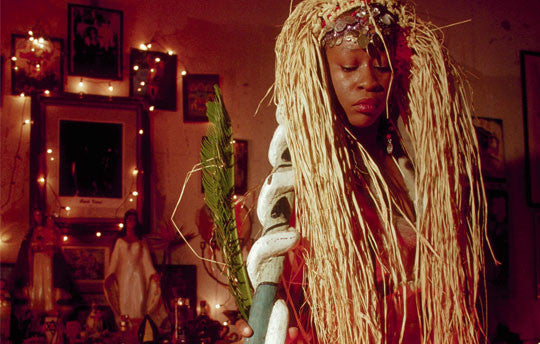Your Cart is Empty

There are many popular misconceptions of the Haitian Vodou religion in Western media. Generations of colonisers and filmmakers in Hollywood exoticised the religion and mispronounced its name as ‘voodoo’ – now the most widely recognised term used to refer to the range of cultures historically related to Haitian Vodou and West African Vodun.
Haitian Vodou originated in Dahomey, (modern-day Benin), brought to the island via the transatlantic slave trade. Its journey can be compared to those travelled by the Santería and Candomblé syncretic religions, brought from Yoruba (modern-day Nigeria) to Cuba and Brazil respectively. During colonialism, indigenous African religious and cultural practices were heavily suppressed. Haitian believers and practitioners of Vodou were forced to adopt Catholicism, and Vodou was forced underground. In reality, the suppression led to a fusion of the two religions: with Vodou practiced in private and Catholicism in public. Like with Santería and Candomblé, music has always played a central part in the religion and continues to do so to this day.
Toto Bissainthe challenged the Duvalier dictatorships (1964 - 1971) of 'President for Life' François Duvalier and his successor and son Jean-Claude Duvalie, by fusing her ballads with rhythms transformed from the sacred music of the then prohibited HaitianVodou. ‘Dey’ is a song of mourning where Bissainthe cries for Haiti’s dead children. Originating in Benin,Gangbé Brass Band creates music that is a blend of West African rhythms, American jazz, and French Colonial brass band music.
In Haitian Vodou, Brazilian Candomblé, and Cuban Santería, there is a physical world and an unseen world. In Santería, God, Jesus and a series of Ioa (spiritual entities which function similar to Catholicism saints) reside. Specific Ioa include Legba (Eleggua in Cuba and Eshu in Brazil) the gatekeeper, whose permission is required for communication between the physical world and that of the unseen.
Lázaro Ros (1925-2005) was Cuba’s most famous akpwan, singer of Toruba ceremonial chants that invoke the Orishas. In 1962, he co-founded Conjunto Folklorico Nacional De Cuba, an ensemble dedicated to preserving the nation’s Afro-Cuban music and dances. Grupo Vocal Desandann (known as The Creole Choir of Cuba) are based in Cuba. ‘Guede Nibo’ is a traditional song dedicated to the deity associated with the spirits of the dead. One of the giants of Brazilian music, Maria Bethânia emerged in the 1960s as a leader of the tropicaliamovement and has since been involved in projects exploring Afro-Brazilian folk forms. ‘Canto de Oxum’ is dedicated to the Yoruba deity of love and intimacy.
The New Orleans variant is referred to as Voodoo. On arrival in the State of Louisiana, slaves were often intentionally separated from their families. New Orleans Voodoo emerged as a binding sense of community in this harsh of environment of separation and isolation.
Born Mac Rebennack, Dr. John began his career as a boogie pianist in New Orleans. In 1968, he recorded the album Gris Gris (named after the protective Voodoo amulet). Marie Laveau (1794-1881) was Louisiana’s most famous Voodoo Priestess. By the 1830s she was a renowned religious oracle and is still celebrated today in song.
Today in Louisiana, there is a dichotomy between the actual religious practice and the exotic image created in part by Hollywood and knowingly cultivated in the tourist industry. Meanwhile, some prominent American political and religious leaders continue to denigrate the religion. Voodoo religion and music is remarkably resilient and has continued to thrive despite virtually every type of suppression throughout the centuries.